#youth mental health
Text
Hey you. Yes you. You have been through enough, you hear me? You. Have. Been. Through. Enough.
The world has treated you shittily, you go through enough, don't do that do yourself too. Be decent to yourself, kiddo. We've only got one of you and it's the best one we have :]
I love you, I'm proud of you, go make yourself a beverage of your choice and be a little more decent to yourself today <3
- dad x
#lgbt#finch rambles#lgbtq#lgbtqia#trans#transgender#queer positivity#trans joy#trans kids#teen mental health#youth mental health#actually mentally ill#mental health
1K notes
·
View notes
Text
i am being so serious when i say that Welcome to the Black Parade (the song mostly, but also the Black Parade album) literally saved my life multiple times when i was like,, 17
so all the criticism and teasing i still get for being Hashtag Emo It’s Not A Phase Mom despite no longer being Emo™️ is something i will willingly take because i know that without the Hashtag Cringe Embarrassing Emo Phase that ruled my life for several years i would be dead. so i don’t care if people think it’s lame
#mcr#my chemical romance#black parade#welcome to the black parade#emo#gerard way#gerard way saved my life#mental health#youth mental health
21 notes
·
View notes
Text
I am playing dnd for charity, more specifically the mix which is a charity dedicated to helping youths and young people, this charity does wonders for peoples mental health. If you want to donate to the cause you can do so here https://www.justgiving.com/page/cgg-nov23?fbclid=IwAR3t4dPxAPNzxw7PdoTt1xoD2-DN9xE9i4nJqKyOMXb6rRu_GlvxfjroTU0 . Last year we raised a massive sum of £2500, exceeding our goal completely. The goal this year is £1500 and I have no doubt in my mind we will exceed it again. If you would like to donate then please do so (and let them Ethan Brownhill sent you) every penny helps but if you can’t donate then please don’t feel obligated to. Thanks!!
You can find out more about the charity gaming guild (the charity hosting this event) here: https://www.facebook.com/charitydnd . Discord link here https://discord.gg/9vANQHyq
#charity#the mix#the mix uk#dnd#dungeons and dungeons#mental health#youth mental health#Reddit refugee
3 notes
·
View notes
Photo
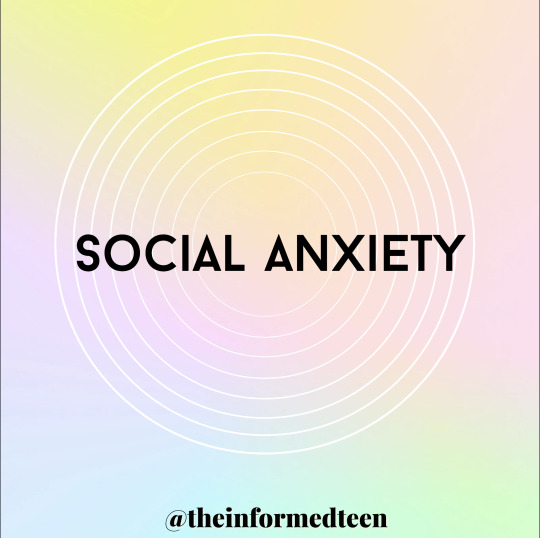


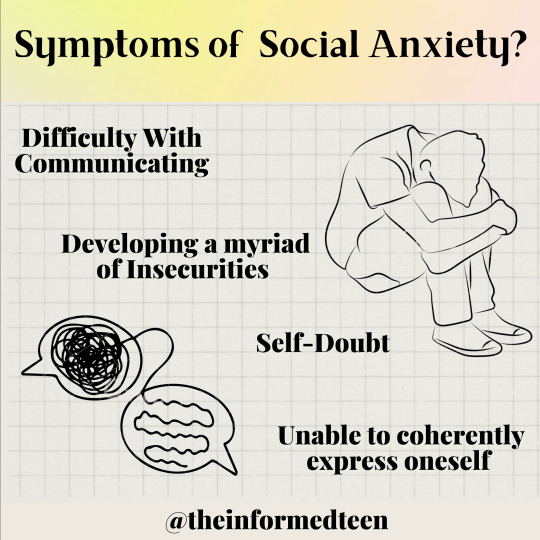
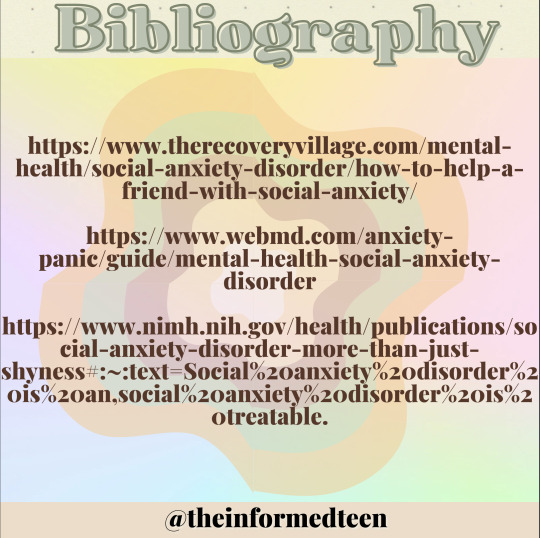
TINFT-Social Anxiety
#fyp#fy#fypシ゚viral#mental health#mental illness#mental health awareness#mental help#mental problems#youth#youth mental health#Youth Community#teens#self love#self growth#mental health support#healingjourney#foryou
9 notes
·
View notes
Text
A close friend of mine tragically lost his battle with mental health on the 16th of February and we are currently raising money to pay for his memorial, his parents are unfortunately not in the picture but he lived with my family for the last two years so we've decided to take it upon our selves to plan this celebration for him. We have partnered with a men's mental health group to help raise awareness for those suffering silently. If you can't donate please share this post so we can reach as many people as possible.
JUSTICE FOR JJ
#mental health#mens mental health#youth mental health#gofundme#mental health awareness#justice for jj
6 notes
·
View notes
Text
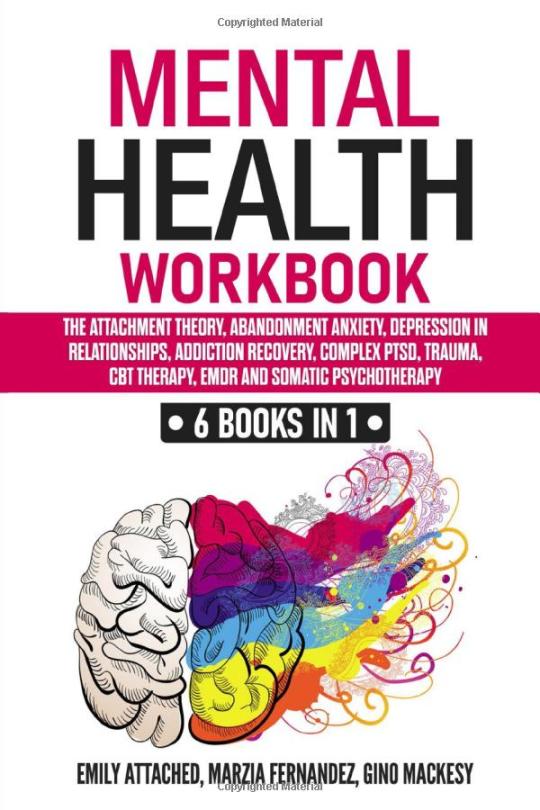
#mental health#mental health awareness#health#mental health book recs#mental health books#mental health awareness video#books for better mental health#self-help books for mental health#mental health book recommendations#my mental health is getting worse#mental health day#nba mental health#tips for mental health#youth mental health#mental health hindi#mental health counselor#what is mental health#mental health issues#mental health salary
4 notes
·
View notes
Text
Emerging from the storm, the lessons learned and battles fought have painted a picture of a journey not just about finding myself but rediscovering who I was meant to be in Christ. The path was fraught with challenges, moments of despair, and encounters with the Lord that reshaped my understanding of life, purpose, and identity.
Jesus revealed Himself and, in doing so, revealed to me the true essence of my being. Not defined by my circumstances, my roles, or my achievements, but defined by His grace, His purpose, and His unwavering belief in me. It was a revelation that shifted everything, turning my identity crisis into a story of supernatural discovery and alignment with a greater calling.
If you've ever felt lost, uncertain of your place in this world, or in search of a deeper connection with your true self and your faith, I invite you to explore this journey with me. Discover the revelations and transformations that await when you surrender to the journey He has in store for you https://www.nicoleodom.com/post/how-god-delivered-me-from-an-identity-crisis
1 note
·
View note
Text
The Puzzle of the Youth Mind
Welcome to "The Puzzle and Facts of the Youth Mind" blog, where we delve into the intriguing complexities of the young generation's psyche.
Understanding the Complexity of the Youth Mind
The teenage mind is a complex enigma that often leaves us puzzled. During adolescence, the brain undergoes significant changes, impacting thinking, behavior, and decision-making. Here are some common complexities:-
Heart Over Mind:-
In the realm of youth minds, the heart often takes precedence over the mind. Emotion and passion guide their decision-making, overpowering rationality.
The impulsive nature of adolescents leads them to listen to their heart's desires, sometimes disregarding logic and consequences. While this may result in occasional missteps, it also fuels creativity, ambition, and the pursuit of dreams.
Is Social Media Real?
The youth mind often accepts social media as an always-real representation of reality. The curated posts, filters, and illusions of perfection can blur the line between virtual and actual life, leading to a belief that what is seen online is an accurate depiction of others' lives.
Loss of Patience:
The youth mind often struggles with a heavy loss of patience in today's fast-paced world. Instant gratification and constant stimulation have become the norm, leading to a decreased tolerance for waiting and delayed rewards.
Technology and the digital age have intensified this impatience, as everything is just a click away. This lack of patience can impact perseverance, problem-solving, and the ability to navigate challenges that require time and effort.
Anticipation more than Action:
Anticipation over action has emerged as a major challenge for the youth mind. The constant exposure to instant gratification has fostered a mindset of seeking immediate rewards without putting in the necessary effort.
The youth often become stuck in a cycle of daydreaming and fantasizing about future accomplishments instead of taking concrete steps toward achieving their goals. Click Here to read more...
Also Read:- Exploring the Psychology of Introverts and Extroverts
1 note
·
View note
Text
Let's Set a Standard
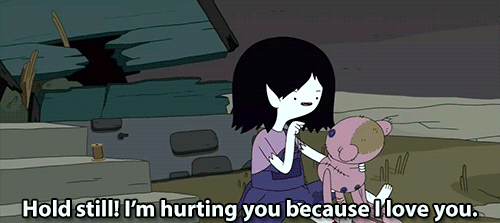
Adventure Time dared to do what many cartoons would never do, they tackled a serious topic which, in this case, was the effects of being abandoned by your parents. The show focuses on how having absent parents can be incredibly difficult, but you still have agency over your life. Marceline’s story is an incredible example for anyone going through similar situations to her. Whether they were also abandoned by their parents or are going through other traumas, Marcy showed us that all you need is to take ahold of your life and have agency over yourself. Although Adventure Time is a children’s cartoon, it addresses real-life issues and situations that many members of their audience have dealt with in their own lives. The writers also used an effective combination of rhetorical appeals through on-screen tactics to display their message. It is so important to address these situations, because going through this and feeling alone can only make things worse. Young people need to feel seen in order to seek help and guidance in finding their own agency. I hope that other shows made for kids follow in Adventure Time’s footsteps and address more serious topics, because the first step to getting help is knowing that you aren’t alone.

1 note
·
View note
Text
Hi. You. Yes you reading this. I'm proud of you. You haven't done anything wrong. You can let go of the thing you're worried about. You can breathe and take a break. You can rest. Love you <3
#lgbt#lgbtq#finch rambles#lgbtqia#trans#transgender#queer positivity#trans joy#trans kids#protect trans youth#i'm proud of you#stay safe kids#positivity post#positivity#doomscrolling#breaking news#youth mental health#mental health
1K notes
·
View notes
Link
0 notes
Text
As I keep shouting into the void, pathologizers love shifting discussion about material conditions into discussion about emotional states.
I rant approximately once a week about how the brain maturity myth transmuted “Young adults are too poor to move out of their parents’ homes or have children of their own” into “Young adults are too emotionally and neurologically immature to move out of their parents’ homes or have children of their own.”
I’ve also talked about the misuse of “enabling” and “trauma” and “dopamine” .
And this is a pattern – people coin terms and concepts to describe material problems, and pathologization culture shifts them to be about problems in the brain or psyche of the person experiencing them. Now we’re talking about neurochemicals, frontal lobes, and self-esteem instead of talking about wages, wealth distribution, and civil rights. Now we can say that poor, oppressed, and exploited people are suffering from a neurological/emotional defect that makes them not know what’s best for themselves, so they don’t need or deserve rights or money.
Here are some terms that have been so horribly misused by mental health culture that we’ve almost entirely forgotten that they were originally materialist critiques.
Codependency
What it originally referred to: A non-addicted person being overly “helpful” to an addicted partner or relative, often out of financial desperation. For example: Making sure your alcoholic husband gets to work in the morning (even though he’s an adult who should be responsible for himself) because if he loses his job, you’ll lose your home. https://www.nytimes.com/2022/07/08/opinion/codependency-addiction-recovery.html
What it’s been distorted into: Being “clingy,” being “too emotionally needy,” wanting things like affection and quality time from a partner. A way of pathologizing people, especially young women, for wanting things like love and commitment in a romantic relationship.
Compulsory Heterosexuality
What it originally referred to: In the 1980 in essay "Compulsory Heterosexuality and Lesbian Existence," https://www.journals.uchicago.edu/doi/abs/10.1086/493756 Adrienne Rich described compulsory heterosexuality as a set of social conditions that coerce women into heterosexual relationships and prioritize those relationships over relationships between women (both romantic and platonic). She also defines “lesbian” much more broadly than current discourse does, encompassing a wide variety of romantic and platonic relationships between women. While she does suggest that women who identify as heterosexual might be doing so out of unquestioned social norms, this is not the primary point she’s making.
What it’s been distorted into: The patronizing, biphobic idea that lesbians somehow falsely believe themselves to be attracted to men. Part of the overall “Women don’t really know what they want or what’s good for them” theme of contemporary discourse.
Emotional Labor
What it originally referred to: The implicit or explicit requirement that workers (especially women workers, especially workers in female-dominated “pink collar” jobs, especially tipped workers) perform emotional intimacy with customers, coworkers, and bosses above and beyond the actual job being done. Having to smile, be “friendly,” flirt, give the impression of genuine caring, politely accept harassment, etc.
https://weld.la.psu.edu/what-is-emotional-labor/
What it’s been distorted into: Everything under the sun. Everything from housework (which we already had a term for), to tolerating the existence of disabled people, to just caring about friends the way friends do. The original intent of the concept was “It’s unreasonable to expect your waitress to care about your problems, because she’s not really your friend,” not “It’s unreasonable to expect your actual friends to care about your problems unless you pay them, because that’s emotional labor,” and certainly not “Disabled people shouldn’t be allowed to be visibly disabled in public, because witnessing a disabled person is emotional labor.” Anything that causes a person emotional distress, even if that emotional distress is rooted in the distress-haver’s bigotry (Many nominally progressive people who would rightfully reject the bigoted logic of “Seeing gay or interracial couples upsets me, which is emotional labor, so they shouldn’t be allowed to exist in public” fully accept the bigoted logic of “Seeing disabled or poor people upsets me, which is emotional labor, so they shouldn’t be allowed to exist in public”).
Battered Wife Syndrome
What it originally referred to: The all-encompassing trauma and fear of escalating violence experienced by people suffering ongoing domestic abuse, sometimes resulting in the abuse victim using necessary violence in self-defense. Because domestic abuse often escalates, often to murder, this fear is entirely rational and justified. This is the reasonable, justified belief that someone who beats you, stalks you, and threatens to kill you may actually kill you.
What it’s been distorted into: Like so many of these other items, the idea that women (in this case, women who are victims of domestic violence) don’t know what’s best for themselves. I debated including this one, because “syndrome” was a wrongful framing from the beginning – a justified and rational fear of escalating violence in a situation in which escalating violence is occurring is not a “syndrome.” But the original meaning at least partially acknowledged the material conditions of escalating violence.
I’m not saying the original meanings of these terms are ones I necessarily agree with – as a cognitive liberty absolutist, I’m unsurprisingly not that enamored of either second-wave feminism or 1970s addiction discourse. And as much as I dislike what “emotional labor” has become, I accept that “Women are unfairly expected to care about other people’s feelings more than men are” is a true statement.
What I am saying is that all of these terms originally, at least partly, took material conditions into account in their usage. Subsequent usage has entirely stripped the materialist critique and fully replaced it with emotional pathologization, specifically of women. Acknowledgement that women have their choices constrained by poverty, violence, and oppression has been replaced with the idea that women don’t know what’s best for themselves and need to be coercively “helped” for their own good. Acknowledgement that working-class women experience a gender-and-class-specific form of economic exploitation has been rebranded as yet another variation of “Disabled people are burdensome for wanting to exist.”
Over and over, materialist critiques are reframed as emotional or cognitive defects of marginalized people. The next time you hear a superficially sympathetic (but actually pathologizing) argument for “Marginalized people make bad choices because…” consider stopping and asking: “Wait, who are we to assume that this person’s choices are ‘bad’? And if they are, is there something about their material conditions that constrains their options or makes the ‘bad’ choice the best available option?”
#mad pride#neurodiversity#ableism#ageism#youth rights#liberation#disability rights#classism#capitalism#mental health culture#pop psychology#feminism#emotional labor
6K notes
·
View notes
Text
Coping with Uncertainty: Youth Mental Health in a Changing World | Solh Wellness
Young people nowadays experience unprecedented amounts of uncertainty as a result of our society's fast and continual transformation. Young people today struggle with a never-ending list of concerns, from technical breakthroughs to political and social upheavals. This article examines how uncertainty affects young people's mental health and offers some recommendations for overcoming these difficulties.
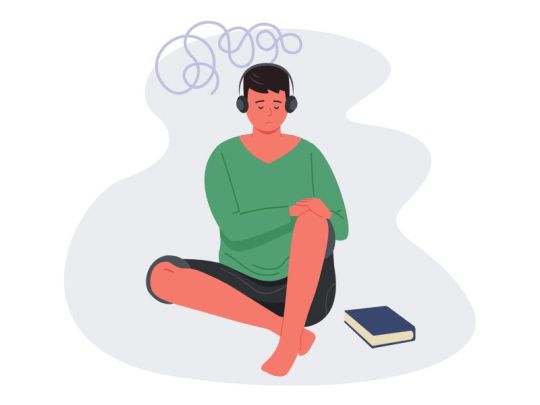
Understanding the Impact of Uncertainty on Youth Mental Health
1. Increased Stress: Young individuals typically experience higher levels of stress due to uncertainty. Concern, tension, or trouble concentrating are symptoms of an extreme dread of the unknown.
2. Poor Self-Image: Uncertainty can encourage self-doubt and a poor view of oneself. Young people may feel inferior to their classmates, which lowers self-esteem and raises the likelihood that they may experience mental health problems.
3. Loss of Control: Young people may experience a loss of control over their lives when faced with uncertainty. The probability of developing mental health conditions like depression is increased by this loss of control, which can further heighten feelings of powerlessness.
Tips for Coping with Uncertainty
1. Keep a Support System in Place: Surround oneself with sympathetic friends, relatives, or mentors who can offer a different viewpoint. Speaking your feelings and thoughts to close friends and family members can be calming and consoling.
2. Seek Professional Assistance: Don't be hesitant to seek professional assistance if uncertainty begins to negatively affect your mental health. To assist people cope with uncertainty and the difficulties that come with it, mental health professionals can offer advice, support, and coping mechanisms.
3. Put Yourself First: Give priority to your own wellness. Engage in relaxing and enjoyable hobbies for a while. This can mean learning a new activity, becoming active, reading, or engaging in mindfulness and meditation exercises.
4. Concentrate on What You Can Control: Pay attention to the areas of your life that you can control rather than dwelling over the parts you cannot. Setting and reaching personal goals or trying to hone abilities that will enable you to successfully handle uncertain situations could be examples of this.
5. Educate Yourself: To help you understand how your environment is changing, keep up with news, trends, and culture. If you are well-informed, you can make decisions with confidence and adjust to changing conditions.
6. Set Realistic Goals: Steer clear of peer comparison and harbouring exaggerated aspirations for the future. Keep in mind that everyone's life journey is different, so it's crucial to concentrate on your own individual development.
7. Develop Resilience: Increasing your capacity to recover from setbacks and adjust to change entails developing resilience. Develop a positive outlook, take lessons from your mistakes, and see obstacles as opportunities for growth.
8. Socialise: Join organisations and activities that share your interests and values. Having a strong sense of community and support from people who share your values can be helpful through difficult times.
ConclusionThe capacity to manage uncertainty is a crucial skill that has a substantial impact on young people's mental health. Young people may be better able to flourish in a rapidly changing society if they are aware of the implications of uncertainty and have coping mechanisms at their disposal. Maintain a strong network of friends and family, put yourself first, concentrate on what you can control, educate yourself, make reasonable goals, practise resilience, and maintain your social ties. One can improve their capacity for resilience, happiness, and all-around wellness by viewing uncertainty as a potential for growth.
#Uncertainty#Impact Of Uncertainty#Coping With Uncertainty#Uncertainty On Youth Mental Health#Youth Mental Health
1 note
·
View note
Text
Social media and youth mental health: Is regulation the answer?
Join the discussion Friday morning at 10.
Wausau Pilot & Review
Social media platforms would be required to verify the age of Wisconsin users and get parental permission to open accounts under a bill state lawmakers are considering, and proposed federal legislation is also gaining traction. At the same time, growing evidence has established both risks and benefits to social media use among young people, leading to questions about how…

View On WordPress
0 notes
Text
Mental Health: The Next Global Pandemic
Our country is facing an unprecedented mental health crisis. The crisis isn’t just affecting adults, its devastating young people, and people from every background are impacted. (Fact Sheet: Celebrating Mental Health Awareness Month 2023)
Mental health has emerged as one of the most pressing public health challenges in the United States. The nation grapples with an unprecedented mental health…

View On WordPress
#access to care#awareness#community mental health centers#Crisis#epidemic#LGBTQ+ community#Mental Health#stigma#Substance abuse#telehealth#trauma#United States#vulnerable populations#workplace programs#youth mental health
0 notes